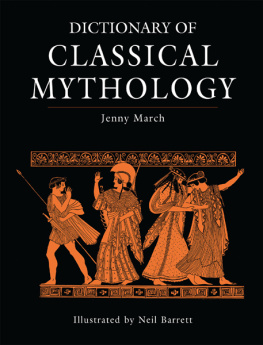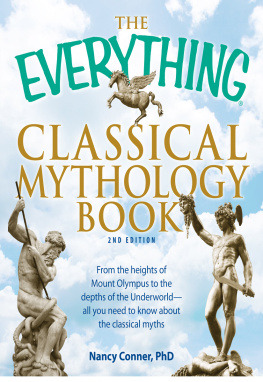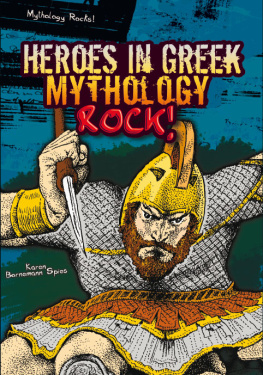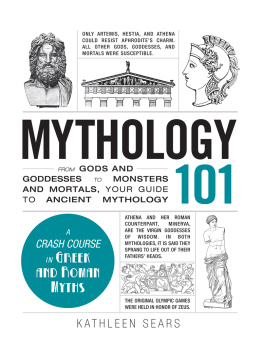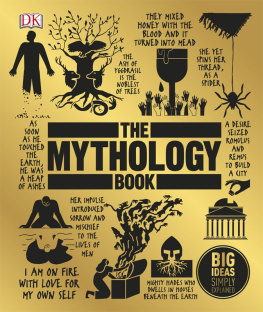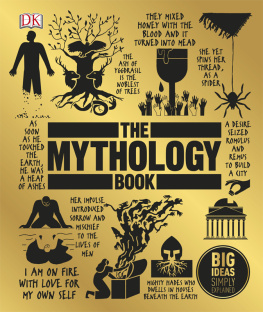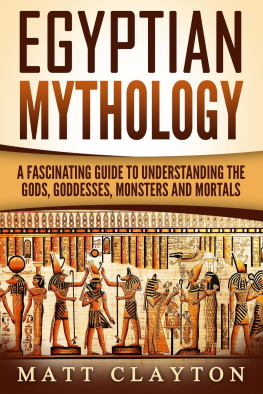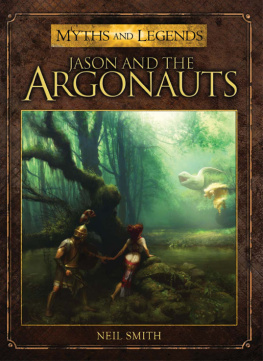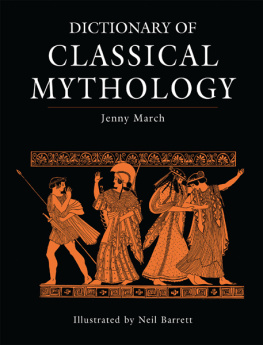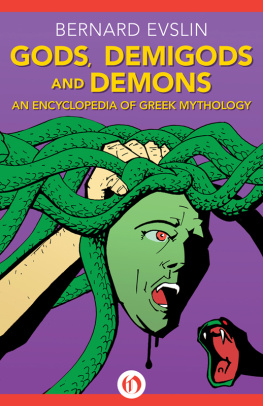To my dear family
to Len, Alex, Robbie and Felicity,
and to Jess, Rosanna, Tom, Joseph, Will,
Sam, Jenny, Rachel and Harry my other magnum opus
First edition published 1998 by Cassell & Co
Second edition published in the United Kingdom in 2014 by
OXBOW BOOKS
10 Hythe Bridge Street, Oxford OX1 2EW
and in the United States by
OXBOW BOOKS
908 Darby Road, Havertown, PA 19083
Text Jennifer R. March 2014, illustrations Neil Barrett 2014
Paperback Edition: ISBN 978-1-78297-635-6
E-pub Edition: ISBN 978-1-78297-636-3; Mobi: ISBN 978-1-78297-637-0; PDF: ISBN 978-1-78297-638-7
A CIP record for this book is available from the British Library
Library of Congress Cataloging-in-Publication Data
March, Jennifer R.
Dictionary of classical mythology / Jenny March ; illustrated by Neil Barrett.
1 online resource.
Includes bibliographical references and index.
Description based on print version record and CIP data provided by publisher; resource not viewed.
ISBN 978-1-78297-636-3 (epub) -- ISBN 978-1-78297-637-0 (mobi) -- ISBN 978-1-78297-638-7 ( pdf) -
ISBN 978-1-78297-635-6 1. Mythology, Classical--Dictionaries. I. Title.
BL715
292.1'303--dc23
2014016224
All rights reserved. No part of this book may be reproduced or transmitted in any form or by any
means, electronic or mechanical including photocopying, recording or by any information storage
and retrieval system, without permission from the publisher in writing.
Printed in the United Kingdom by Short Run Press, Exeter
For a complete list of Oxbow titles, please contact:
| UNITED KINGDOM | UNITED STATES OF AMERICA |
| Oxbow Books | Oxbow Books |
| Telephone (01865) 241249, Fax (01865) 794449 | Telephone (800) 791-9354, Fax (610) 853-9146 |
| Email: | Email: |
| www.oxbowbooks.com | www.casemateacademic.com/oxbow |
Oxbow Books is part of the Casemate Group
| Front cover: | Theseus abandons Ariadne, as Athena ushers him off to the left and Dionysus leads Ariadne off to the right. Illustration: Neil Barrett |
| Back cover: | Odysseus advances with drawn sword. With him are two victims of Circe?s enchantments, a donkey and a pig. Illustration: Neil Barrett |
CONTENTS
PREFACE
This book is rather like the mythical phoenix, rising from the ashes, metaphorically speaking, of a previous existence. Its first incarnation was as The Cassell Dictionary of Classical Mythology, published in 1998 with 148 illustrations. In 2001 this was turned into a thick paperback, far too chunky for comfortable use, and with no illustrations at all. I was not surprised when it went out of print. Saddened, yes, because the book had won the 1999 Runciman Award and I believed it to be a good and useful one, having been written both as a celebration of a vital and fascinating subject, and as a key to the world of classical myth for anyone wishing to delve more extensively into its many joys.
So I was deeply delighted when Clare Litt, of Oxbow Books, said that she would like to publish a new version of it, if only there were not the problem of getting permissions, both time-consuming and costly, for all those original illustrations. And then a miracle occurred or so it seemed to me. My son-in-law Neil, who is an artist in his spare time, offered to draw and paint copies of some of the Greek vases. It seemed miraculous too when, only nine months later, he had completed 147 of them, even though of course this wasnt a miracle at all, but the result of sheer hard work and persistence.
Many of these illustrations have been redrawn from the 1998 volume and at the same time much improved, since the original reproductions were often indistinct or too small. Many too are new. We also managed to interweave among the drawings some twenty-five photographs, so the illustrations of the original book have been upgraded to a huge extent, both in quality and quantity. The text too has been much improved, so the end result is (I hope) a phoenix far finer than before.
It will be a great joy to me to have this book see the light of a new incarnation, and I must offer my warmest thanks to a number of people. First of all to Clare Litt, without whom there would be no book at all. To everyone else at Oxbow who have been involved in seeing the book through the press, and especially to Lizzie Holiday and to Sam McLeod for all their help. To Chris Collard, who painstakingly read through my manuscript and offered many valuable suggestions (though he is of course in no way responsible for any deficiencies remaining), and who suggested the compilation of the Index of Recurrent Motifs which will, I hope, be an invaluable tool for students of the myths. And of course to my son-in-law Neil Barrett, who made the book possible, and laboured long and hard to produce so many wonderful illustrations.
And finally, as always, to my entire family, who bring me joy in any number of ways: to my husband Len, my three daughters Alex, Robbie and Felicity, and my nine grandchildren, and not forgetting my sons-in-law Rod, Neil and Dave. This book is dedicated to them, as it was from the beginning; and I would like to add one further dedication, to a dear friend, so sadly no longer with us: with a raised glass of Chianti Classico, to David West.
Jenny March
April 2014
INTRODUCTION
For centuries people have spoken of the Greek myths as of something to be rediscovered, reawoken. The truth is, it is the myths that are still out there waiting to wake us and be seen by us, like a tree waiting to greet our newly opened eyes.
Roberto Calasso, The Marriage of Cadmus and Harmony
Greek and Roman Myths
The myths of ancient Greece and, later, Rome form the Classical Mythology of our title. Myths were at the heart of ancient Greek life and culture. They held a central place at public and private gatherings. They were told and retold by the poets, changing and developing as time went by. From the later sixth century BC onwards they formed the subjects of gripping dramas played out on the tragic stage. A major part of all education was the memorising and reciting of epic poems on mythical subjects.
The myths were also depicted all around in the visual arts, again both publicly and privately, such as on temple sculptures, and on the pottery vessels of everyday domestic use. Even the physical world rivers, springs, woods, mountains, the very earth itself was seen as alive with divine presences, and in the time of Homer, whose Iliad and Odyssey give us our first recorded myths, the gods still walk among men.
Moreover these myths were more than mere stories. To the Greeks they were history, telling of real events in their heroic past, while a mans genealogy, often originating from a divine mythical ancestor, showed his place in the world and his relation to the great heroes of myth. Certain of the myths details might certainly be questioned: the historian Herodotus, for instance, writing in the later fifth century BC, may doubt one of the stories about the great hero Heracles (
So the myths were central to Greek culture which meant that they were known far and wide, since Greek culture itself was spread over a much more extensive area that the Greece we know today. During the Archaic (700500 BC) and Classical (500323 BC) periods, Greeks i.e. Greek-speaking peoples occupied not only mainland Greece to the north through Macedonia, and to the east through Thrace to the Hellespont, but also the islands of the Aegean and the western coast of Asia Minor (present-day Turkey). Moreover many Greek colonies were founded in further-flung areas, both to the east, especially around the Black Sea, and to the west in southern Italy and Sicily, the colonies here being known by the Latin name Magna Graeca.
Next page
